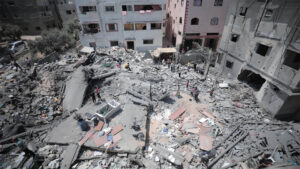Israel and Iran are still going at it, but things have not significantly escalated. Here’s a breakdown of the situation and what could come next.
Israel has been able to take out Iran’s air defenses and strike some key nuclear sites, especially at the Natanz facility that enriches mid-grade uranium. However, all of Iran’s advanced stuff is dispersed and hidden deep underground, which is beyond Israel’s current strike capabilities. Iran’s retaliatory missile strikes have been largely ineffective due to poor targeting capabilities and strong Israeli defense systems.
So, Israel can continue to hit targets that delay and stall Iran’s nuclear program, but outright destroying the nuclear program probably isn’t in the cards. The question then becomes – what is Israel’s victory condition? If fully eliminating Iran’s nuclear capabilities is off the table, will they turn towards crippling Iran’s economy?
It remains unclear where and how far the Israelis will take this campaign, but unless they escalate their effort, they’ll just be buying time.
Transcript
Hey, all, Peter Zeihan here. Coming to you from Colorado. We are going to talk about the status of the air war between Iran and Israel. Today it is the 16th of June. You’ll be seeing this one in the morning. Short version. It hasn’t gotten all that serious from a physical damage point of view, especially on the Israeli side.
Iran lacks meaningful long range power production capacity. They’ve got a lot of missiles. But they’re not particularly smart. And the Israelis have a pretty good theater missile defense. And that’s before you consider the Americans are helping as well. So no appreciable damage inflicted within Israel at the moment. Going the other direction. The Israelis have been primarily targeting air defense, which has proven to be woefully inadequate, on the Iranian side and have taken out the easy targets in the Iranian nuclear development program, most notably the centrifuge complexes at Natanz.
That is where most of the centrifuges are. That’s where they take raw yellowcake, which is processed, uranium ore and turn it into a kind of a mid enriched uranium. From that point, the stuff is then sent to other facilities to go to highly enriched uranium. And the idea would be that if you get highly enriched enough that you could make a actual bomb.
No indications at the moment that the Iranians have been getting to the level of enrichment that is necessary to then go to the next part of the process. The problem that the Israelis are facing is that those more advanced centrifuges, the one that goes a higher percentage of fissile material, are underground. They’re buried. They’re dispersed.
Keep in mind that the Iranians have kind of been playing with their nuclear industry for 30 years now, and the Iranians always assumed that when the bombs actually fell on them to break up their nuclear program, it was going to be the United States dropping the bombs. And the United States would have had things like aircraft carriers in the Persian Gulf that would be flying out of places like Kuwait and gutter.
And so there would be lots and lots and lots of sorties dropping very, very advanced bombs that are designed to penetrate very, very deep places. Israelis don’t have any of that. They’re flying from an extra thousand kilometers away. They don’t have the deep penetration capacity. So can Israel hurt Iran? Of course. Can they take it all out? I really doubt it.
It’s an open question whether the United States could, which means that the Iranian nuclear program is only stalled so long as the bombing continues, and Israel only has so many weapons that can be used in this conflict. So the question we need to start asking ourselves is, what is the victory condition for Israel? Because their ability to actually destroy everything in the nuclear program is probably not going to happen.
So what they seem to be doing is going after the power infrastructure and the access infrastructure to delay what’s left of the Iranian nuclear program as long as possible, which is a reasonable plan. And then the question becomes whether or not they decide to do more to set back Iran. More generally, going after military sites is kind of pointless because Iran’s military, for the most part, is infantry based.
And if you’re doing long range pinpoint attacks, you’re just not going to break it up in any meaningful way. But you could torpedo the Iranian economy by going after the oil refining capacity. Iran is an oil exporter, not merely what they used to be back in their heyday, probably only about a million, a million and a half barrels a day.
Today. That includes the smuggling, but they are highly dependent upon fuel processing at home just to keep the country together. So if you go after the refineries, which are much easier than going after the oil fields, the Israelis could achieve two things. Number one, that could destabilize the internal regime, because if there’s not fuel, it’s really hard to maintain an industrial level economy.
And second, it would actually probably pour some literal oil on troubled waters, because if the Iranians can’t process the crude into fuel, they would then be forced to export more crude, which would actually weirdly push oil prices down. Something to consider. No sign that the Israelis are doing that right now, but considering their limited options for actually removing the nuclear card from the board, it’s something that seems pretty feasible to me.









